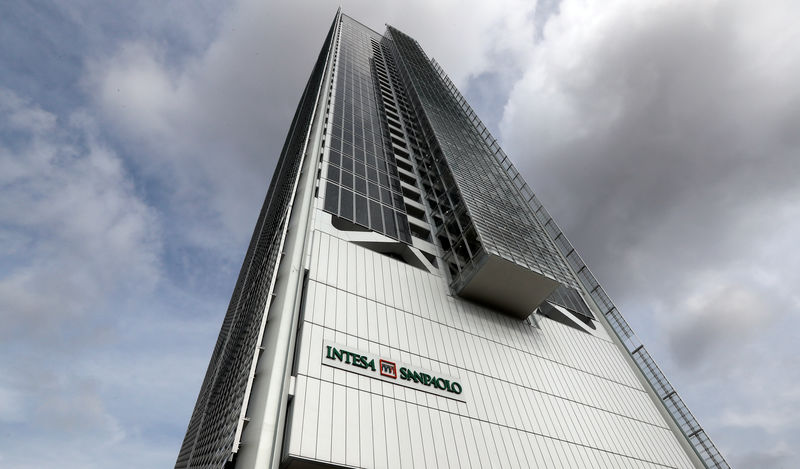(This July 3 story has been refiled to give more approximate figure in paragraph 16)
By Valentina Za
MILAN (Reuters) - How do you value a bank loan on the brink of default in an economy flirting with recession?
As it prepares to commit to buying billions of euros of such loans in Italy by mid July, U.S. hedge fund Davidson Kempner Capital Management (DKCM) has deployed legions of number crunchers to find out.
Their task is fiendishly complicated, with businesses' survival chances often hinging on the prospects for debt restructurings, turnaround plans, securing new investment or even hiring new managers.
But the implications of their work go far beyond the fate of individual borrowers as their success could bolster Italy's banking system and its economy, the euro zone's third largest.
DKCM and its Italian arm Prelios, a bad loan recovery specialist, entered exclusive talks in late March to take on up to 10 billion euros ($11 billion) in so-called 'unlikely-to-pay' (UTP) loans from Italian bank Intesa Sanpaolo (MI:ISP).
The deal, expected to be clinched this month, is the biggest transaction in Italy so far involving UTP loans, which are not yet in default but are deemed unlikely to be recovered in full.
Italian banks' clean-up efforts have so far focused on the worst-performing loans, with large-scale sales helping lenders shift nearly 170 billion euros in impaired debt off their books in the past three years.
UTPs are the next frontier if banks are to finally put behind them the legacy of a brutal recession.
"Sales of non-performing loans are a crucial way for Italian banks to free up capital," said former Treasury economist Lorenzo Codogno, founder of LC Macro Advisors.
That is particularly important at a time when risk premiums on Italian assets have risen under the country's populist government, weakening the balance sheets of its banks and leading them to rein in lending vital for economic growth.
Italian banks hold some 80 billion euros in UTPs, which they price on average at 61% of nominal value - well above a net book value of 35% for banks' remaining 100 billion euros in insolvent loans.
The higher net book value potentially exposes lenders to larger losses in the event of a sale and this has so far held back disposals.
Two sources familiar with the matter said Intesa had demanded from the start a price close to book value for the portion of the portfolio to be sold, which will amount to no more than 40% of the 10 billion euros.
The rest will be taken under management by Prelios, which has been aggressively hiring new staff in recent months to strengthen its loan recovery capabilities, the sources said.
Intesa and DKCM declined to comment.
ROME WATCHING
A deal could spur the UTP market, where the top six transactions, according to consultancy PwC, last year totalled less than 3 billion euros.
One source said other banks were ready to follow suit, in the same way that Intesa's landmark sale of its bad-loan unit to Swedish debt collector Intrum last year was followed by a similar deal struck by Banco BPM (MI:BAMI) with Elliott-backed Credito Fondiario.
Banco BPM is seen as a leading candidate to consider UTP disposal options. The bank declined to comment.
Italian authorities are watching developments in the UTP market, two institutional sources said, because regulators are aware of the need for banks to reduce UTPs but also of the challenges posed by this type of loans.
More than three quarters of Italian UTPs are held by Italy's top 10 banks and half of them by the top three, PwC says.
UTP borrowers are yet to be declared insolvent and can be restored to health. But the first hurdle is to decide whether to embark on a costly and complex restructuring process or simply liquidate the loans.
"UTPs are like the victims of an explosion: the first thing a doctor on the scene would do is to decide which patients have an actual chance of surviving," said Marco Sion Raccah, general manager of Aurora Recovery Capital, a UTP recovery specialist.
"Recovering UTPs is more expensive and complicated than recovering bad loans."
It took more than 100 people about six months just to estimate the recovery rate on roughly 1,000 Intesa loans that were examined in a due-diligence process conducted by DKCM-Prelios with the help of advisers EY, KPMG and PwC, the two sources familiar with the matter told Reuters.
The recovery process is no simpler: for each loan, a debt restructuring accord alone can cost more than 100,000 euros, and a turnaround plan requires working-capital financing and often new managers and fresh equity.
Raccah said successfully recovering a real-estate UTP offered a 20-40% upside over its liquidation value, but high fixed recovery costs meant a loan had to be worth at least 1 million euros for the process to be economically viable.
In a country of small businesses, just over half of Italian bad loans are above that threshold, PwC says.
"With some UTPs effectively headed for liquidation, successful recovery means that you have to be an excellent turnaround expert across industries as well as a good liquidator: it's not easy," one source said.
